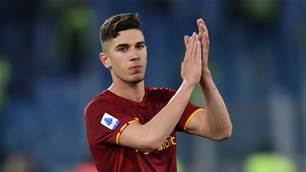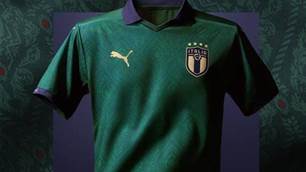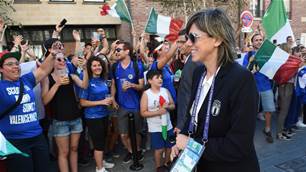ITALY coach Marcello Lippi was right about one thing heading into the World Cup finals.
He said that all was not well with the Azzurri.
Draws against Cameroon and Switzerland, and a 2-1 defeat to Mexico, in their warm-up games had raised alarm bells in the country.
Two weeks later and Italy left the World Cup after failing to win a game.
Draws against Paraguay and New Zealand were followed by a humiliating 3-2 defeat to Slovakia in their final group game.
There was no sense of urgency in the play of the Italians until it was too late, at the end of the Slovakia game and so they went from World Cup winners to World Cup flops.
"It's sad because a team like Italy shouldn't be out in the group stages," said Argentina coach Diego Maradona.
"But you could clearly see that something was missing, especially in attack.
"Perhaps you would have needed a player like (Roma captain Francesco) Totti or even (Sampdoria striker Antonio) Cassano."
Totti had retired after the last World Cup but was apparently open to a comeback, while Cassano was never picked by Lippi.
Lippi thought he knew best. He was, after all, the man that led them to the world title in 2006 in Germany.
His return to the helm shortly after the Italians' Euro 2008 quarter-final exit had been well received and he guided them to seven wins and three draws in qualifying where they finished top of Group Eight with a six-point advantage over the Republic of Ireland.
After the setback against Mexico, Lippi remained optimistic that his side would find its stride when it mattered.
He said at the time: "This is not the Italy I know. But what matters is the 30 to 40 days that we are there. I know that when we are together like this, we always manage to produce something good."
The Azzurri travelled to South Africa in a positive frame of mind.
Italian football had seen its reputation enhanced when Inter Milan prevailed in the Champions League to cap in a treble-winning campaign.
But with no Italian players in Inter's starting XI and Lippi's reluctance to hand young talent Mauro Balotelli his national team debut, Inter's success meant nothing for the Italians.
If there had been those who disagreed with Cassano's exclusion, there were even more who felt Villarreal forward Giuseppe Rossi, just one of the few Italians competing abroad, should not have been left out of the 23-man squad.
He had shone at the Confederations Cup a year earlier.
Lippi opted to include nine players of the 2006 World Cup-winning side, with veterans Fabio Cannavaro, Gianluca Zambrotta and Gennaro Gattuso among them.
The trio had unconvincing domestic campaigns and went on to be outclassed by their rivals in South Africa, with both Cannavaro and Gattuso retiring from internationals after the tournament.
Lippi's over-reliance on players from his former club Juventus also angered many.
Six Juve players were in the squad despite the Turin giants' under-par display in Serie A last term.
"Lippi pointed towards Juventus players that finished 10 points behind Palermo in the standings," said Palermo striker Fabrizio Miccoli.
Juve finished seventh in Italy's top flight.
Among those players were Juve pair Vincenzo Iaquinta and Mauro Camoranesi.
Iaquinta started in Italy's attack in all the Group F games despite having mustered just six goals in a campaign plagued by injuries.
Moreover, Juve winger Camoranesi sustained a muscular injury before the tournament and never looked in good condition.
Gianluigi Buffon suffered a herniated disc in his team's opener against Paraguay and was ruled out for the rest of the tournament.
An injury to Andrea Pirlo hit Italy hardest.
The AC Milan playmaker, the brains behind the Azzurri's play for the last eight years, sustained a calf injury in the friendly against Mexico.
He only returned as a substitute in the final game against Slovakia but was clearly not completely recovered.
Without Pirlo, Italy lacked creativity.
"The problem is we don't have a new Totti and a new (Juventus forward) Alessandro Del Piero in Italy," said captain Cannavaro.
Azzurri fans never understood why Angelo Palombo made the trip to South Africa because the Sampdoria captain, who improved his play-making skills in a fine season with the Blucerchiati, did not play in the World Cup.
Another Samp player that was overlooked was Giampaolo Pazzini, who had gone into the competition in form after scoring 19 times for Samp last season.
Pazzini only played 30 minutes as a substitute against New Zealand as Lippi instead opted for Iaquinta, Alberto Gilardino and Antonio Di Natale.
Fiorentina's Gilardino, who ended up as top scorer for the Azzurri in qualifying with four goals, left the competition without finding the back of the net.
Udinese's Di Natale proved to be another disappointment by missing a hatful of chances.
After an arduous season with Roma, midfielder Daniele de Rossi looked but a shadow of himself.
Two of his mistakes saw Italy concede goals.
Lippi, who announced he would leave the Azzurri after the World Cup, did one thing right.
"I take all responsibility for what happened," he said after the loss to Slovakia.
"It means the coach didn't train that team as he should have done, psychologically, technically or tactically. I take on all responsibilities for the choices I made."
Italy now begin a new chapter under Cesare Prandelli hoping a lesson has been learned.
Draws against Cameroon and Switzerland, and a 2-1 defeat to Mexico, in their warm-up games had raised alarm bells in the country.
Two weeks later and Italy left the World Cup after failing to win a game.
Draws against Paraguay and New Zealand were followed by a humiliating 3-2 defeat to Slovakia in their final group game.
There was no sense of urgency in the play of the Italians until it was too late, at the end of the Slovakia game and so they went from World Cup winners to World Cup flops.
"It's sad because a team like Italy shouldn't be out in the group stages," said Argentina coach Diego Maradona.
"But you could clearly see that something was missing, especially in attack.
"Perhaps you would have needed a player like (Roma captain Francesco) Totti or even (Sampdoria striker Antonio) Cassano."
Totti had retired after the last World Cup but was apparently open to a comeback, while Cassano was never picked by Lippi.
Lippi thought he knew best. He was, after all, the man that led them to the world title in 2006 in Germany.
His return to the helm shortly after the Italians' Euro 2008 quarter-final exit had been well received and he guided them to seven wins and three draws in qualifying where they finished top of Group Eight with a six-point advantage over the Republic of Ireland.
After the setback against Mexico, Lippi remained optimistic that his side would find its stride when it mattered.
He said at the time: "This is not the Italy I know. But what matters is the 30 to 40 days that we are there. I know that when we are together like this, we always manage to produce something good."
The Azzurri travelled to South Africa in a positive frame of mind.
Italian football had seen its reputation enhanced when Inter Milan prevailed in the Champions League to cap in a treble-winning campaign.
But with no Italian players in Inter's starting XI and Lippi's reluctance to hand young talent Mauro Balotelli his national team debut, Inter's success meant nothing for the Italians.
If there had been those who disagreed with Cassano's exclusion, there were even more who felt Villarreal forward Giuseppe Rossi, just one of the few Italians competing abroad, should not have been left out of the 23-man squad.
He had shone at the Confederations Cup a year earlier.
Lippi opted to include nine players of the 2006 World Cup-winning side, with veterans Fabio Cannavaro, Gianluca Zambrotta and Gennaro Gattuso among them.
The trio had unconvincing domestic campaigns and went on to be outclassed by their rivals in South Africa, with both Cannavaro and Gattuso retiring from internationals after the tournament.
Lippi's over-reliance on players from his former club Juventus also angered many.
Six Juve players were in the squad despite the Turin giants' under-par display in Serie A last term.
"Lippi pointed towards Juventus players that finished 10 points behind Palermo in the standings," said Palermo striker Fabrizio Miccoli.
Juve finished seventh in Italy's top flight.
Among those players were Juve pair Vincenzo Iaquinta and Mauro Camoranesi.
Iaquinta started in Italy's attack in all the Group F games despite having mustered just six goals in a campaign plagued by injuries.
Moreover, Juve winger Camoranesi sustained a muscular injury before the tournament and never looked in good condition.
Gianluigi Buffon suffered a herniated disc in his team's opener against Paraguay and was ruled out for the rest of the tournament.
An injury to Andrea Pirlo hit Italy hardest.
The AC Milan playmaker, the brains behind the Azzurri's play for the last eight years, sustained a calf injury in the friendly against Mexico.
He only returned as a substitute in the final game against Slovakia but was clearly not completely recovered.
Without Pirlo, Italy lacked creativity.
"The problem is we don't have a new Totti and a new (Juventus forward) Alessandro Del Piero in Italy," said captain Cannavaro.
Azzurri fans never understood why Angelo Palombo made the trip to South Africa because the Sampdoria captain, who improved his play-making skills in a fine season with the Blucerchiati, did not play in the World Cup.
Another Samp player that was overlooked was Giampaolo Pazzini, who had gone into the competition in form after scoring 19 times for Samp last season.
Pazzini only played 30 minutes as a substitute against New Zealand as Lippi instead opted for Iaquinta, Alberto Gilardino and Antonio Di Natale.
Fiorentina's Gilardino, who ended up as top scorer for the Azzurri in qualifying with four goals, left the competition without finding the back of the net.
Udinese's Di Natale proved to be another disappointment by missing a hatful of chances.
After an arduous season with Roma, midfielder Daniele de Rossi looked but a shadow of himself.
Two of his mistakes saw Italy concede goals.
Lippi, who announced he would leave the Azzurri after the World Cup, did one thing right.
"I take all responsibility for what happened," he said after the loss to Slovakia.
"It means the coach didn't train that team as he should have done, psychologically, technically or tactically. I take on all responsibilities for the choices I made."
Italy now begin a new chapter under Cesare Prandelli hoping a lesson has been learned.
Copyright (c) Press Association
Related Articles

Aussie young gun nets winner for Italy at Euros U19s

PUMA release commemorative Italian 'renaissance' kit













